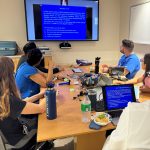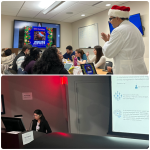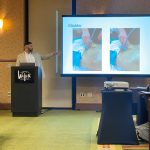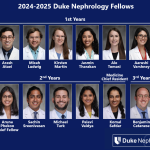Background
Providing graduate medical trainees (trainees) with a sound academic and clinical education must be carefully planned and balanced with concerns for patient safety and trainee well being. Each program must ensure that the learning objectives of the program are not compromised by excessive reliance on trainees to fulfill service obligations. Didactic and clinical education must have priority in the allotment of trainees’ time and energies. Duty hour assignments must recognize that program directors, faculty, and trainees collectively have responsibility for the safety and welfare of patients and adherence to this policy. The institution is committed to the promotion of an educational environment, support of the physical and emotional well-being of its graduate medical trainees, and the facilitation of high quality patient care.
Policy
As an accredited ACGME sponsoring institution with ACGME accredited programs, DUH shall maintain compliance with ACGME requirements or ACGME’s interpretation of such requirements; therefore, this policy will be superseded by any applicable revisions to ACGME institutional, common or specialty specific program requirements.
Programs must maintain compliance with this policy and any additional specifications provided by individual ACGME Review Committees in order to maintain sponsorship by DUHS.
This policy applies to all institutions at which trainees rotate and to all trainees in ACGME accredited or internally sponsored programs.
Duty Hours – Maximum Hours of Clinical and Educational Work per Week
- Clinical and educational work hours must be limited to no more than 80 hours per week, averaged over a four-week period, inclusive of all in-house clinical and educational activities, clinical work done from home, and all moonlighting.
- Trainees must have at least 14 hours free of clinical work and education after 24 hours of in-house call.
- Trainees must be scheduled for a minimum of one day in seven free of clinical work and required education (when averaged over four weeks). At-home call cannot be assigned on these free days.
- Adequate time for rest and personal activities must be provided. This should consist of a 10-hour time period (and must consist of an 8-hour period) provided between scheduled duty periods. Intermediate-level trainees must have 14 hours free of duty after 24 hours of in-house duty.
On-Call Activities
The objective of on-call activities is to provide trainees with continuity of patient care experiences.
In-house call
- PGY-2 trainees and above must be scheduled for in-house call no more frequently than every third night, averaged (when averaging is allowed by the relevant RRC) over a four-week period.
- Trainees must not be scheduled for more than six consecutive nights of night float.
- Continuous on-site duty, including in-house call, must not exceed 16 hours for PGY-1 trainees. Duty periods of PGY-2 residents and above may be scheduled to a maximum of 24 hours on continuous duty in the hospital. Residents may be allowed to remain on-site for no longer than four additional hours for effective transitions of care and didactic learning. Trainees must not be assigned additional clinical responsibilities after 24 hours of continuous in-house duty.
At-home call
- At-home call must not be so frequent or taxing as to preclude rest and reasonable personal time for each trainee.
- The frequency of at-home call is not subject to the every third night limitation. Trainees taking at-home call must be provided with 1 day in 7 completely free from all educational and clinical responsibilities, averaged over a 4-week period. At-home call cannot be assigned on these days.
- When trainees are called into the hospital from home, the hours trainees spend in-house are counted toward the 80-hour limit.
- The program director and the faculty must monitor the demands of at-home call in their programs and make scheduling adjustments as necessary to mitigate excessive service demands and/or fatigue.
Moonlighting
- Because graduate medical education is a full-time endeavor, the program director must ensure that moonlighting does not interfere with the ability of the trainee to achieve the goals and objectives of the educational program.
- Internal and External Moonlighting must be counted towards the 80-hour maximum hour limit.
- First-year Nephrology fellows are not permitted to moonlight.
- Payment is $110/hour and is paid the following month after you work.
Approval Process
- To moonlight you need to have an approved TSMA on file in MedHub. The request cannot cross academic years (First years will need to apply for June of their first year and then reapply for July-June of their second year. Both requests can be initiated at the same time, but must be two separate forms). This approval is only good for one year so upper levels need to re-request for the following year. This request can take up to a month to process and you are not allowed to log any moonlighting hours until your TSMA is approved in MedHub.
- Instructions for submitting your TSMA request
- Your Chief Fellow will create the moonlighting schedule for shift sign-ups.
Logging your Time:
- Please log your moonlighting hours in MedHub as you work them.GME does not like for coordinators to log back hours and you need to meet the monthly deadline (you’ll get an email from GME when the deadline is near). The supplemental payment deadline for the month does not always allow you to wait until the end of the week when you normally log your duty hours. Please be sure to log them not as standard hours but as Internal Moonlighting hours. Once you’ve selected internal moonlighting, your hours will change from blue to yellow to reflect the different status.

- Send Teresa Grabarek teresa.grabarek@duke.edu and Marissa Carvalho Marissa.Carvalho@duke.edu an email when you finish a moonlighting shift. The email needs to contain:
- DAY OF WEEK OF SHIFT (Sunday or Wednesday, etc.)
- date of shift
- Hours works (e.g 5pm-7am)
- Total Hours worked (14hrs)
- Indicate that you’ve worked a “shift” rather than using the word moonlighting
- They use information to confirm the QGenda schedule. If you change your moonlighting schedule please contact Dr Sparks so the change appears on the QGenda calendar.
- Please log your moonlighting hours in MedHub as you work them.GME does not like for coordinators to log back hours and you need to meet the monthly deadline (you’ll get an email from GME when the deadline is near). The supplemental payment deadline for the month does not always allow you to wait until the end of the week when you normally log your duty hours. Please be sure to log them not as standard hours but as Internal Moonlighting hours. Once you’ve selected internal moonlighting, your hours will change from blue to yellow to reflect the different status.
Oversight
- Each program must have written policies and procedures consistent with the Institutional, Common and Program Requirements for trainee duty hours and the working environment. These policies must be distributed to the trainees and the faculty. Trainees are required to log duty hours. Monitoring of duty hours is required with frequency sufficient to ensure an appropriate balance between education and service.
- Back-up support systems must be provided when patient care responsibilities are unusually difficult or prolonged, or if unexpected circumstances create trainee fatigue sufficient to jeopardize patient care.
- Surveillance of duty hours will be the continuing responsibility of the Resident Environment Section of the Institutional Committee for Graduate Medical Education (ICGME) who will report to the full ICGME at least biannually.
- Violations of the duty hour standards may result in institutional sanctions, such as withdrawal of program sponsorship or Corrective Actions for Associate Members of the Medical Staff.
Duty Hours Exception
Some RRCs may grant exceptions for up to 10% of the 80-hour limit, to individual programs based on a sound educational rationale. However, prior permission of the ICGME is required.








































































































































































